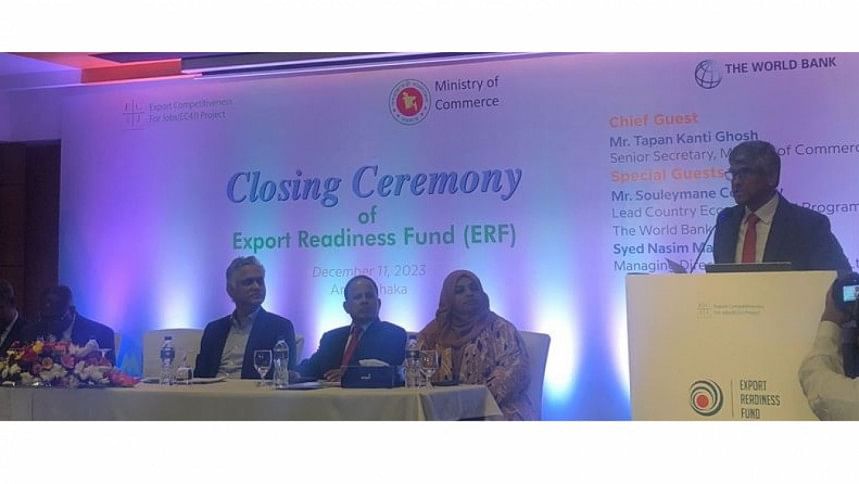Inter-ministerial coordination needed for export diversification

Businesses often face hassles when trading in Bangladesh due to a lack of inter-ministerial coordination, which is a big hurdle for export diversification, a top footwear exporter said yesterday.
"Although the commerce ministry leads projects, other agencies such as customs and banks are often not on board or aligned with the projects to boost competitiveness," said Syed Nasim Manzur, president of the Leather Goods and Footwear Manufacturers and Exporters Association of Bangladesh.
Manzur made these remarks while speaking at a closing ceremony for Export Readiness Fund (ERF), which is a part of an Export Competitiveness for Jobs (EC4J) project funded by the World Bank.
The commerce ministry hosted the event at Amari Dhaka.
Regarding the current obstacles to doing business, Manzur said firms have been struggling to open letters of credit for importing raw materials and other necessities.
Besides, it has also become difficult to get timely customs clearance for even industrial machinery, he said.
"For example, we lost at least 70 days in one instance due to delays in the customs process," he added.
Manzur also said the current global economic slowdown is more severe than that resulting from the Covid-19 pandemic.
So, support for all enterprises, particularly small and medium-sized ones, is really needed to protect exports, employment and investment, he added.
And considering the inflationary pressure in the country, he suggested that Bangladesh focus on reducing lead times by improving efficiency and thereby becoming more competitive in the global market.
Manzur also recommended supporting innovation, productivity, product design and development, acquisition of intellectual property, and long-term affordable financing for ensuring export diversification.
Speaking as chief guest, Commerce Secretary Tapan Kanti Ghosh said export diversification beyond garments is a big dilemma.
"The country will have to break this deadlock as Bangladesh has duty free access in all developed countries sans the US," he said.
"We are doing well domestically in many manufacturing sectors but still we are not being able to gain success in the global market," he added.
The ERF, a $17.5 million-financial grant programme of the World Bank, was launched in January 2020 under the EC4J project which is being implemented by the commerce ministry.
The EC4J aims to further factory compliance and increase the competitiveness of four targeted export sectors, namely leather and leather goods, footwear, plastics and light engineering products.
A total of 570 enterprises in the four sectors received financial and technical support under the ERF.

 For all latest news, follow The Daily Star's Google News channel.
For all latest news, follow The Daily Star's Google News channel. 



Comments